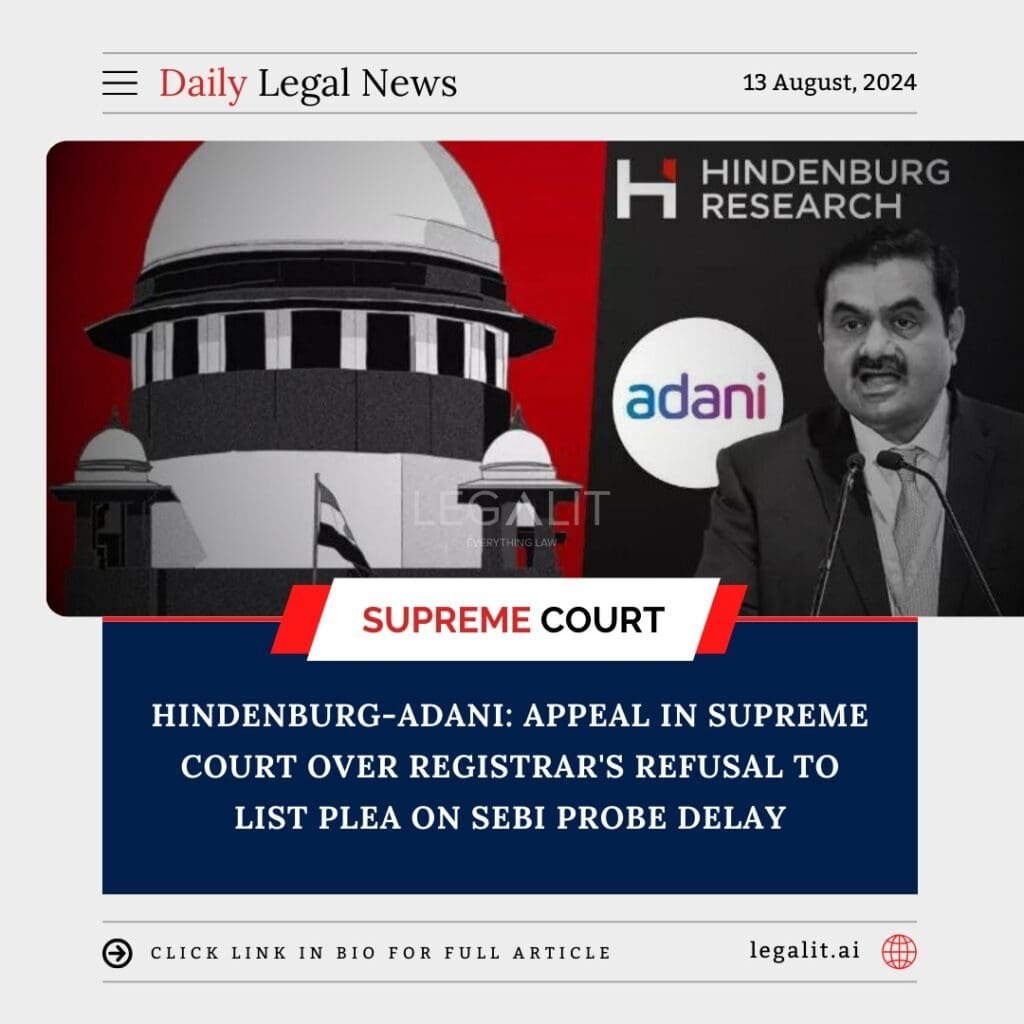
In a developing legal situation, an appeal has been filed in the Supreme Court of India, raising concerns that the Registrar has refused to list a plea regarding the alleged delay in the Securities and Exchange Board of India’s (SEBI) investigation into the Hindenburg-Adani case. This case revolves around serious allegations made by Hindenburg Research against the Adani Group, one of India’s largest conglomerates, and the subsequent probe by SEBI into these claims.
Background of the Hindenburg-Adani Case
Hindenburg Research, a U.S.-based investment research firm known for its activist short-selling reports, released a report in January 2023 accusing the Adani Group of stock manipulation, accounting fraud, and other financial irregularities. The allegations sent shockwaves through the Indian financial markets, leading to a significant drop in the shares of Adani companies and sparking widespread debate.
Following these allegations, SEBI, India’s market regulator, launched an investigation into the Adani Group’s dealings to determine the veracity of Hindenburg’s claims and assess whether any securities laws were violated. However, concerns have since emerged about the pace and transparency of SEBI’s investigation.
The Supreme Court Appeal
- Delay in SEBI Probe: The appeal in the Supreme Court stems from concerns that SEBI’s investigation into the Hindenburg-Adani case has been delayed, potentially affecting the outcomes and broader implications of the probe. The petitioner is seeking judicial intervention to expedite the investigation and ensure transparency and accountability in the process.
- Registrar’s Refusal to List Plea: The appeal specifically challenges the Registrar’s refusal to list the plea, which is seen as a procedural hurdle that prevents timely judicial review. The petitioner argues that the delay in listing the plea exacerbates concerns about the pace of SEBI’s investigation and the potential for justice to be delayed.
- Judicial Oversight: The appeal underscores the importance of judicial oversight in matters of significant public and financial interest. The petitioner is seeking the Supreme Court’s intervention to ensure that the SEBI probe is conducted efficiently and that any delays are addressed promptly.
Implications of the Appeal
The appeal to the Supreme Court has several key implications:
- Judicial Scrutiny of Regulatory Delays: The case highlights the role of the judiciary in scrutinizing regulatory processes, particularly in cases involving large-scale financial allegations. The Supreme Court’s intervention could set a precedent for how regulatory delays are handled in future cases.
- Impact on SEBI’s Credibility: The delay in SEBI’s investigation, coupled with the refusal to list the plea, could impact the credibility of the regulator. Ensuring a timely and transparent probe is crucial for maintaining confidence in India’s financial regulatory framework.
- Market Stability: The outcome of this appeal could influence market stability, particularly in relation to the Adani Group’s standing in the financial markets. A swift resolution to the investigation could help restore investor confidence.
- Public Interest: The case is of significant public interest, given the size and influence of the Adani Group in India’s economy. The appeal underscores the need for transparency and accountability in addressing allegations of corporate misconduct.
Moving Forward
As the appeal is considered by the Supreme Court, several steps will be critical:
- Expediting the Process: The Supreme Court may need to expedite the listing and hearing of the plea to address concerns about delays in the SEBI investigation. This would ensure that the judicial process keeps pace with the regulatory investigation.
- Ensuring Transparency: The Court could direct SEBI to provide regular updates on the progress of its investigation, enhancing transparency and public trust in the process.
- Legal Precedent: The Supreme Court’s ruling on this appeal could set an important legal precedent regarding the handling of regulatory delays and the role of the judiciary in overseeing such matters.
- Investor Confidence: A clear and decisive ruling could help stabilize market perceptions, particularly regarding the regulatory environment in India and the handling of high-profile financial cases.
Conclusion
The appeal in the Supreme Court regarding the delay in SEBI’s investigation into the Hindenburg-Adani case and the Registrar’s refusal to list the plea underscores the critical need for timely and transparent regulatory action in cases of significant public and financial interest. As the Supreme Court considers this appeal, the outcome will likely have far-reaching implications for regulatory oversight, market stability, and public confidence in India’s financial institutions. The case serves as a reminder of the importance of judicial intervention in ensuring that regulatory processes are conducted efficiently and with integrity.